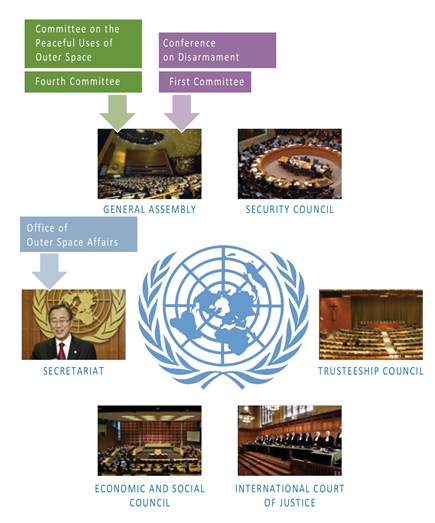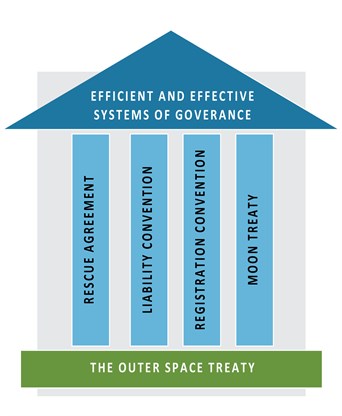International Governance of Space Activities
Although some may think space is ungoverned, there are in fact a number of existing international treaties that provide a legal framework. The United Nations plays a significant role in the governance of space activities and the negotiation and adoption of international treaties and other agreements on space, but there are other bodies that play a role as well.
The United Nations and Space
The United Nations General Assembly (UNGA) is composed of 193 Member States (as of 2012). Six permanent committees help the UNGA manage its work on global issues; for space matters, two committees are especially important. The First Committee deals with disarmament and security matters and the Fourth Committee focuses on special political matters, including outer space. The Committee on the Peaceful Uses of Outer Space (COPUOS) is the UN body responsible for developing policies related to outer space on behalf of the UN Member States. It does not deal with military space issues. COPUOS reports each year to the UNGA via the Fourth Committee. The Office of Outer Space Affairs (OOSA) is the secretariat for COPUOS and carries out COPUOS policies as part of the larger UN Secretariat. The Conference on Disarmament (CD), which is not a UN organization but works under the UN auspices, is the international forum for work on disarmament, and therefore the body responsible for matters related to weapons in space and other space security issues. The CD reports its annual findings to the UNGA via the First Committee.

Composed of 74 Member States and 29 permanent observers (including SWF), COPUOS is the premier international forum for working out issues of space governance. Its work is divided between two subcommittees: the Scientific and Technical Subcommittee and the Legal Subcommittee. Matters that come before COPUOS are deliberated first in working groups within one of the subcommittees and when agreement is reached, the matter is presented to the full committee as a report of the Subcommittee. After additional deliberation, COPUOS will prepare a report and possibly a resolution for presentation to the General Assembly for its approval as a UN resolution.
The Space Treaties
COPUOS was responsible for the crafting of the five treaties that address activities in outer space. The 1967 Outer Space Treaty (OST) sets out the foundations of outer space law elaborated upon in the later agreements. Additional non-binding agreements for outer space have been developed by COPUOS to address orbital debris mitigation, cooperative arrangements for sharing remote sensing data, and other related matters.

- The Outer Space Treaty was opened for signature in 1967 and entered into force the same year. One hundred states have ratified the treaty, which provides the basic framework for international space law. Key principles include the exploration and use of outer space for peaceful purposes by all States for the benefit of mankind, barring of national appropriation or claims of sovereignty of outer space or celestial objects, ban on placement of weapons of mass destruction in orbit or on celestial bodies, and that States are required to supervise the activities of their national entities.
- Rescue Agreement (1968) Requires States to take steps to rescue and assist astronauts in distress and return them to the launching state, and assist launching states in recovering space objects that return to Earth outside the territory of the launching state.
- Liability Convention (1972) Outlines the liability of Launching States for damage caused by their space objects on the Earth or in space, and procedures for the settlement of claims for damages.
- Registration Convention (1976) Launching States must maintain a registry of their space objects and provide the UN with information on the objects they launch into outer space.
- Moon Treaty (1984) Reaffirms and elaborates OST provisions applied to appropriation and exploration of the Moon and exploitation of resources found on the Moon. Though technically in force, this treaty has been ratified by relatively few countries and is ignored by most.
International Telecommunications Union
During the 1960s, it became clear that private and public use of geosynchronous orbit for telecommunication and other services would need to be regulated using an international system agreed upon by stakeholder nations. The International Telecommunication Union (ITU), established in 1865 to develop international radio communication standards, was tasked in 1963 by the UN to manage the GEO belt for purposes of preventing physical and electromagnetic interference. The ITU's Radio-communication Sector is responsible for assignment of GEO slots to States.
The ITU assigns GEO slots to the Member states by considering orbital parameters (west or east degrees longitude), type of frequencies used, and covered regions (or footprint). Member states use national regulations to license their use of assigned GEO slots.
Inter-Agency Space Debris Coordination Committee
The Inter-Agency Space Debris Coordination Committee (IADC) is an international forum of governmental bodies for the coordination of activities related to the issues of natural and man-made debris in space. The primary purposes of the IADC is to exchange information on space debris research activities between member space agencies, facilitate opportunities for cooperation in space debris research, to review the progress of ongoing cooperative activities, and to identify debris mitigation options.
In 2007, the IADC published a set of voluntary guidelines designed to reduce the creation of orbital debris. In 2008, most of these guidelines were included in a resolution proposed by COPUOS and passed by the UNGA. Guidelines include:
- Limit production of debris during routine operations.
- Minimize the potential for accidental on-orbit breakups.
- Dispose of spacecraft post-mission.
- Prevent on-orbit collisions.
- Prohibit intentional destruction of satellites.

 Share
Share